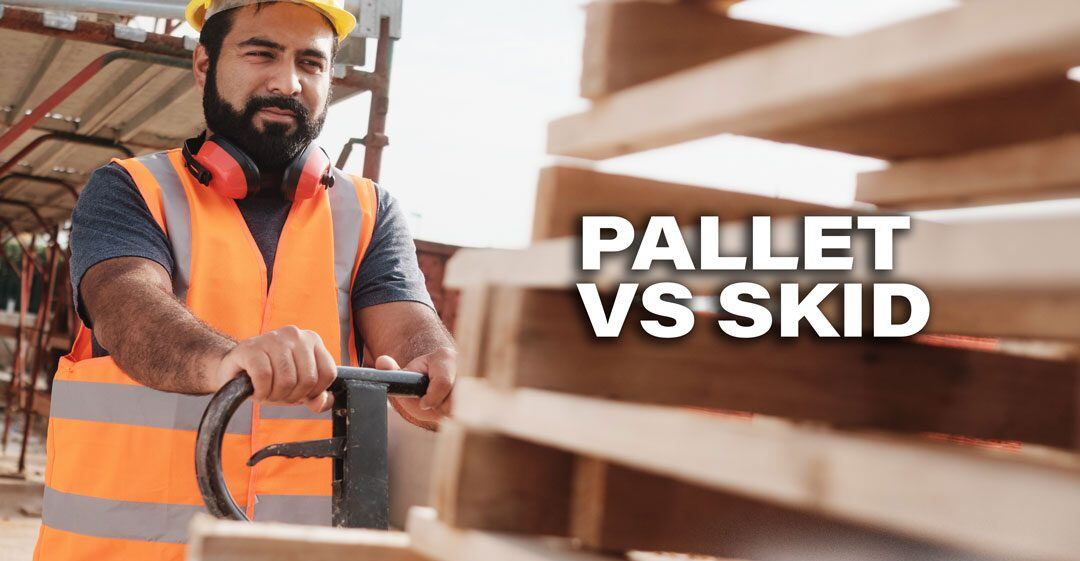
Truck Broker vs. Freight Forwarder: 12 Key Differences
Trucking is a vast industry that benefits many people, but most do not know the difference between a truck broker and freight forwarder. Although they sound like the same thing, it is crucial to know the difference because whether your shipment is executed by a truck broker vs freight forwarder can significantly impact the handling of packages and goods, and you deserve to know what is happening to your freight.
Twelve key differences of truck broker vs. freight forwarder are:
| Characteristics | Truck Brokers | Freight Forwarders |
| Handling | Never take physical possession of the items being shipped. | May or may not take physical possession of the freight. |
| Resources | Do not need equipment or much space for their business. | May or may not operate warehouses, trucks, and hire workers. |
| Legal | Never take legal possession of the items being shipped | Always take legal possession of the items being shipped. Must be on the Bill of Lading |
| Multi-Modal | Do not handle multi-modal shipping | Knits together multiple modes to create door to door service worldwide |
| Outsourcing | Brokers contract carriers; they do not operate trucks | Forwarders may or may not operate warehouses and/or trucks, ships, planes |
| Carriers | Carriers are responsible for the items they are shipping, and are paid by the broker. | Carriers are responsible to the forwarder for items they are shipping, and forwarder is responsible to shipper |
| Buyers/Sellers | Brokers do not have to take responsibility for any of your items. | Forwarders are legally responsible for your items and can be held accountable. |
| Starting Business | As a broker, there are not many requirements for starting your business. | To be a forwarder, you need to register with the government, have insurance, space, and many employees. |
| Earning | Brokers are paid on commission by the number of shippers that they connect with carriers. | Forwarders are paid by the shipper and then pay all their employees. |
| Hiring Carriers | Brokers do not hire carriers. They outsource to shipping companies. | Forwarders hire all carriers and employees and pay them by a fixed rate. |
| Insurance | Brokers have limited insurance requirements . | Forwarders need to have extensive insurance and provide proof of it. |
| Helping Shipper | Brokers provide expert buying, facilitating, and advocacy for shippers. | Forwarders provide high-touch service and hands-on help to customers. |
The 12 Key Differences of Truck Broker vs. Freight Forwarder
Whether you are a shipper who needs to understand how liability or services differ between brokers and freight forwarders or a trucking company who wants to understand the difference between working for one or the other; you will find these 12 key differences draw and easy to understand picture.
1. Handling
One of the two really big truck broker vs. freight forwarder differences comes down to who handles the freight
- A truck broker simply makes sure the items being shipped get where they need to go. They do not handle or take the items into possession. They work much like any other kind of broker and serve as a go-between for the buyer and seller.
- On the other hand, a freight forwarder may or may not take the items into possession depending on whether they operate their own transport assets or subcontract transportation from others. They may even take the items into their possession for a portion of the journey, outsourcing other legs of the journey to other transport providers.
The result is the items being shipped go where they need to go, so while both are dealing with the business of shipping items and transporting them via modes of transportation, they do this in different ways.
2. Legal Difference
Like any other industry, shipping has a legal side that must be adhered to. And this legal difference is the other really big difference between truck broker vs. freight forwarder. The Bill of Lading is an integral part of the transportation and shipping industry. It is a standardized contract and receipt that serves as proof of shipment.
- It is required for freight forwarders, as they take legal possession of the goods before transporting them (regardless of whether they take physical possession or not). Legally, forwarders are responsible as the carrier of the freight throughout the entire shipment regardless of whether they are transporting on their own assets or using a sub-contracted carrier. Their position on the Bill of Lading puts them first in line for cargo claims of loss, damage or shortage. Because of this legal liability, freight forwarders are required to carry certain insurance coverages as part of their regulation by the FMCSA.
- Truck brokers are not required to be on the Bill of Lading. As brokers do not take legal possession, they do need not have liability for the freight in-transit. As such, brokers do not carry insurance for damage or loss to cargo, nor for liability related to operating trucks or other transportation assets. Brokers are regulated by the FMCSA with separate responsibilities from motor carriers and freight forwarders.
3. Resources
In the shipping industry, tons of storage, large vehicles, and workforce are involved. But between truck broker vs. freight forwarder, there is a difference in resources needed to run their operation.
Truck brokers need not have any warehouses or trucks, as they are the middleman between the buyer and seller or shipper and consignee. Their work can be done from anywhere. Theoretically, your broker could just be one person running their operation from their house. This is unlikely, but possible, as they are regulated only at the federal level.

Freight forwarders need a network of both owned and subcontracted resources:
- Warehouses
- Trucks
- Trailers
- Truck terminals or Cross-Docks
- Workers to make it all flow
They are much more involved in the actual trucking service and need the personnel to manage that. This means space to house goods, teams for the financial and technical side of things, and the actual vehicles and people to operate them.
4. Multi-modal Shipping
Shipping is a global industry, and many goods are shipped across the world. But what many people don’t know is that truck brokers do not primarily handle international shipping. This boils down to the simple fact that most international shipping involves multiple modes and truck brokers are best with single mode shipments. A simple truckload between Texas and Montreal is easily within the capability of most truck brokers. But the same move from Texas to Madrid is a non-starter.

Freight forwarders can handle shipping that goes to a different country or maybe even across multiple countries. They specialize in knitting together multiple transport providers using multiple modes to handle complex shipments. They can deal with the legal requirements of the different countries and their transportation laws. This means that most imports and exports are handled by forwarders rather than brokers.
A forwarder presented with our shipment from Texas to Madrid Spain would arrange a drayage operator to deliver a container to be loaded, set up the transport of the loaded container to the port, book passage from the US port to Spain, and then arrange ground transport to collect the container from the ship and deliver to consignee in Madrid coordinating all the details of the many legs and legalities in-between.
5. Outsourcing
Brokers actually can’t move the freight themselves. As an authorized broker they don’t have the authority to act as a motor carrier or trucking operator. So, they must subcontract all movement. Some trucking companies with FMCSA motor carrier authority will form a subsidiary to act as a broker for overflow situations in their trucking operator. In these cases the two related companies contract with themselves to preserve the broker-carrier relationship.
Forwarders, who are treated much like motor carriers by regulatory authorities, generally have a terminal or warehouses and personnel in a given gateway city and supplement their resources by outsourcing transport, handling, and warehousing away from their physical service area. So, they do handle shipping and transportation on their own, at lease for a portion of the transit. So, forwarders generally use a blend of company employees and assets with subcontracted employees and assets to accomplish each shipment.
6. What This Means for Carriers
If you are a motor carrier seeking to haul freight for a truck broker vs freight forwarder can be a difficult decision to make. By understanding the difference, you could potentially save yourself a bunch of money and legal issues in the future.
When working for a forwarder, you, as the carrier, are responsible to the forwarder for the items you are transporting.
- Because multiple legs or modes of transportation are frequently used make sure you get clear, damage-free delivery receipts. The freight forwarder will not likely know where the damage in-transit occurred and will seek recompense from all carriers in the chain.
- Liability rules are based on the origin of the shipment; so beware what liability you may take on delivering an international import.
Brokers often work remotely, so you might not be able to go in and meet them. Meetings will often be on the phone. This brings up the risk of legitimacy. Make sure the company you are working for is legit by doing research. There are always people looking to scam you, so be careful.
- Always check to make sure all items are in the best shape possible, and that there is no damage. This will take some time, but it is very much worth it in the long run.
- Read through documents carefully before signing any rate sheets. The documents are legally binding, and you should know what’s on them.
7. Buyers and Sellers
Once you know what the difference between a truck broker vs freight forwarder, you must choose which to use if you are selling or buying products. This decision is vital because who is legally responsible for the package can determine what condition you get it in, or if you get it at all.
Brokers
Brokers are not legally responsible for the items being shipped. So, if, for example, there is an issue and a claim is put on hold, the carrier and shipper are responsible. The broker would try to help, but again, is not legally responsible. So, if you are using a broker, it is probably a good idea to stay in constant communication with the buyer and broker.
Also, make sure that the brokering company has a plan in place for handling claim holds and other shipping issues. This way, you know they have at least some way of dealing with the problem instead of washing their hands of it and claiming no responsibility.

Forwarders
Forwarders are legally responsible for the goods they handle, so they can be held accountable for the goods. When dealing with a forwarder, make sure to check your items for damage and shortages. This kind of problem can be taken to the company with the potential for reimbursement for the damages.
Whatever you decide to use, keep a close eye on your items. Always research the company you are using, because unfortunately there are many people running scams to take advantage of people.
8. Starting Your Business
If you are looking to start your business in the trucking industry, there are some things to keep in mind. They include:
- Legal requirements.
- Good practices to follow.
- Ways to build lasting relationships with clients.
But above all, you should know the details of what it means to be a broker or a forwarder because it can mean very different things. It can affect where you work, what you need, and what you do.
Even if you are a carrier, whether you decide to work with a shipping company that is contracted, or with a forwarding company can be affected. Because as a carrier, you are working for a fixed rate. So, you probably want to be working for the company that does the best job of managing their carriers.
Brokers
If you are looking into the brokering side of trucking, it is somewhat simpler. You do not need to have a huge warehouse or even do any transporting. You just need to know how to communicate with the carriers, buyers, and sellers. Your primary job will be to connect the shipper and carriers. Depending on your situation, you can probably just work from an office or even from home.
You do not need any people, as the brokering business does not have that many parts to it. So, you could just be a one-person operation working out of your house, or you could work with a whole team to get more shipments done more efficiently.
You will want to keep a good relationship with the buyers and carriers, as being irresponsible can come back to bite you. Have contingency plans on how to manage claim holds, damaged, or missing goods. Because even if you are not legally responsible for these things, ignoring them can and will give you a bad reputation. That is something that will stick to you, which you want to avoid.
Forwarders
If you are looking into the forwarding business, there is much more involved, such as:
- Warehouses.
- Trucks.
- Carriers.
- Legal issues
- The Bill of Lading
As a forwarder, you need to be registered with the Federal Motor Carrier Safety Administration (FMCSA). You will be operating under their authority in interstate or foreign commerce. You must also have carrier insurance and register with the Highway Administration.
So, it is a much more involved process. It also has more risks as you are legally responsible for all goods, damages, and missing items. Just do your research and be prepared to deal with the complications that come with having your own business.
9. Earning
Another difference involves how truck broker vs freight forwarder makes money. They both have different ways that correlate with the kind of work they do for their clients. Brokers earn a commission on the shipments they broker. The more sellers that they connect to carriers, the more money they make. The amount they make also depends on how much it costs to ship the product, and size, weight, etc.
Forwarders make money from the entire shipping process. They are paid by the seller for the shipping, and they get all that money. Out of that, they pay the carriers and their general costs. The remainder is their net profit.
10. Hiring Carriers
Beyond the logistics of the trucking industry are the people who are transporting the goods: the carriers. They are the people who get in their trucks and drive across the country to get packages to the buyer. Carriers are used by both brokers and forwarders but in different ways.
- Brokers must research and find shippers and carriers. They then must contact them and form a contract for the work. Essentially, the broker is outsourcing the shipping, as is detailed above. The shipping company will charge a fee, and the broker pays them from the commission he is paid. This is the way brokers hire carriers.
- Forwarders hire the shippers and carriers themselves. They act as both the broker and the shipping company. The carriers work for the forwarder for a set rate, and the forwarder is paid by the buyer.
11. Insurance
One distinct difference between truck broker vs freight forwarder that does not entirely fall under the legal section is the insurance. In the transportation industry, insurance is used to protect the items being transported, and the insurance carrier is legally responsible for the items.
- Brokers are not required to have any kind of carrier insurance, as they are never in possession of or at all responsible for the shipped items.
- Forwarders, as mentioned previously, are very much responsible for the goods they are transporting. So, they must have carrier insurance, insurance on all their equipment and vehicles, and extremely comprehensive cargo insurance.
It is always a good idea to check and make sure the forwarding company you are using has these insurances. Because if they do not, then anything that happens to your packages can’t be held against them. It is also very illegal for a forwarder to not have these insurances.
12. Helping the Shipper
Brokers and forwarders both deal with the person shipping the items. They communicate with and help them through the process, but in slightly different ways.
A broker would provide more logistical help. They would connect the shipper with the carrier, and the financial side of things—so more technical and logistical, but not much practical help, like how to label a container.

Forwarders give practical help, though. They often provide instructions on how to prepare packages for different types of transport. Because international shipping instructions can be very different from local ones, the forwarder will help them make sure there are no hazardous materials in the package, and that it is all up to standard.
Proper packaging can mean the difference between having your items shipped or returned. Incorrectly labeled packages and products stand no chance against security, as many of you probably know from being in customs. So, it is essential to have the right information on how to label and identify your package, whether you use a broker or a forwarder.
In Conclusion
When it comes down to it, truck brokers and freight forwarders are, in fact, different. They have different jobs, are paid differently, and even have different legal requirements. And, they produce different results for you, the shipper. Your broker is an expert at single-mode transportation saving you time and money shopping, arranging, and monitoring shipments. Your freight forwarder is an expert at complex multi-modal shipments involving customs documentation. Knowing these things before you choose which to use is essential. Because whether you are a buyer, seller, carrier, or someone looking to be a broker or forwarder, this is something you likely care about..
Sources:
https://truckerpath.com/blog/how-do-freight-brokers-find-shippers/
https://www.rtsinc.com/articles/freight-forwarder-vs-freight-broker
https://surety1.com/freight-brokers-vs-freight-forwarders-what-you-need-to-know/
https://www.penskelogistics.com/solutions/freight-brokerage/forwarder-vs-broker/
http://www.americanfreightways.net/blog/difference-between-a-freight-broker-and-a-freight-forwarder/
https://www.flockfreight.com/2018/05/11/freight-forwarder-vs-freight-brokers/
https://work.chron.com/freight-broker-vs-freight-forwarder-6435.html
https://www.apexcapitalcorp.com/blog/whats-the-difference-between-a-broker-and-a-freight-forwarder/



